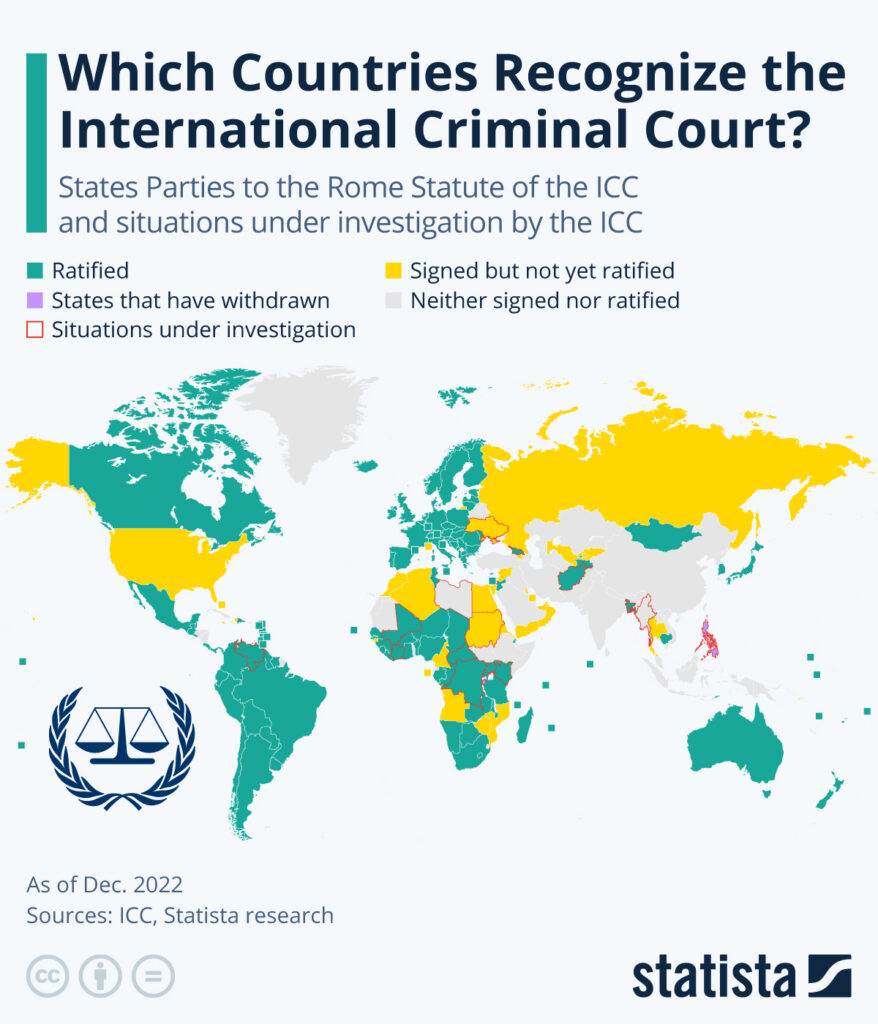A Historic Withdrawal
A historic decision for an EU country, Hungary announced its intention to withdraw from the Rome Statute of the ICC on April 3, 2025. This will make it the only non-signatory country among the 27 EU members. This withdrawal comes in the context of Israeli Prime Minister Benjamin Netanyahu’s visit to Budapest, where he was welcomed despite an international arrest warrant against him.
Netanyahu’s Visit to Europe
Benjamin Netanyahu, Prime Minister and head of the government of Israel, made his first visit to Europe since 2023, traveling to Budapest on April 3. This visit comes after the issuance of an international arrest warrant by the ICC for Netanyahu, in November 2024.
Did Hungary Have an Obligation to Cooperate?
The 125 states that signed the Rome Statute are obligated to cooperate with the ICC, including executing arrest warrants issued by the Court. Hungary, having signed the Statute in 1999 and ratified it in 2001, was supposed to arrest Netanyahu on its territory. By welcoming him without handing him over to international justice, Hungary violated its international obligations.
However, there is a conflict of international norms when the arrest warrant targets a head of state or government. Indeed, there is a customary international law rule (informal law) that grants criminal immunity to them and prevents their arrest during their mandate.
A Controversial Article: Article 98 of the Rome Statute
Moreover, Article 98 of the Rome Statute states that a State is not required to surrender a head of state or government if doing so would violate its existing international obligations, particularly regarding diplomatic immunity. Several signatory states have cited this article in the past to justify their refusal to cooperate.
« The Court may not proceed with a request for surrender or assistance which would
Rome Statute of the International Criminal Court (ICC)
require the requested State to act inconsistently with its obligations under international
law with respect to the State or diplomatic immunity of a person or property of a
third State »
What Are the Charges?
Since November 2024, Benjamin Netanyahu has been targeted by an ICC arrest warrant, holding him responsible for war crimes and crimes against humanity committed in the Gaza Strip. Former Israeli Defense Minister Yoav Gallant is also targeted by this warrant.
They are accused of using « famine as a method of warfare » by restricting humanitarian aid to Gaza Strip. But also of intentionally targeting civilians as part of Israel’s campaign against Hamas. Israeli officials rejected these accusations.
Why Hungary Refused
During this visit, Hungarian Prime Minister Viktor Orbán announced that his country would withdraw from the ICC, a decision that will be effective in one year. Orbán justified the decision by stating that the ICC is « no longer an impartial court, nor a court of justice, but a political court. » He also added that Hungary is not bound by the ICC’s decisions, as the Rome Statute has never been incorporated into Hungarian law.
A Three-Step Withdrawal Process
In accordance with Article 127 of the Rome Statute, Hungary’s withdrawal from the ICC will proceed in three stages:
- First, the Hungarian parliament will adopt a law formalizing Hungary’s withdrawal from the Rome Statute.
- Then, Hungary will officially notify the UN Secretary-General of its withdrawal.
- Finally, the withdrawal will take effect one year after the notification.
Until then, Hungary remains « obligated to cooperate » with the ICC until the end of the withdrawal process. (It should be noted that this withdrawal is not retroactive: it does not affect the Court’s jurisdiction over crimes committed while Hungary was still a member of the Rome Statute.)
Until its official withdrawal, Hungary has until May 23, 2025, to present evidence in its defense to the ICC.
What Is Hungary Facing for Refusing Cooperation?
Hungary’s refusal to cooperate with the ICC could lead to diplomatic or economic sanctions. In the event of non-cooperation, the ICC can refer the matter to the Assembly of States Parties or the UN Security Council.
A Possible EU Reaction
The European Union could also consider imposing sanctions. Ratifying the Rome Statute is considered an implicit condition for EU membership. All member states have signed and ratified it, affirming their commitment to the Union’s core values.
Hungary’s withdrawal is seen as a challenge to these commitments, especially regarding international justice and the principles of the Union. The EU could examine Hungary’s situation under Article 7, paragraph 1, of the Treaty on European Union (TEU), which allows action in the event of a serious violation of EU values, such as the rule of law, democracy, and fundamental rights.
These concerns are not new. Hungary has already been criticized for its judicial reforms, press freedom violations, restrictions on NGOs, and pressure on universities.
The most severe sanction would be the suspension of Hungary’s voting rights within the EU Council. However, such a decision would require unanimity from all the other member states, which remains unlikely.
A Controversial Warrant Among ICC Members
The immunity of heads of state divides ICC member states. Some countries, like France and Italy, remain reserved on this issue. According to them, Benjamin Netanyahu benefits from immunity as the head of government of a non-ICC member state, in line with Article 98 of the Rome Statute, while affirming their commitment to respecting international law.
Poland officially supported diplomatic immunity. In January 2025, Polish Prime Minister Donald Tusk declared that Netanyahu would not be arrested if he attended a commemoration ceremony at Auschwitz, citing the symbolic and historical importance of the event.
In contrast, other countries have affirmed their intention to comply with the ICC’s decision. Spain, for example, stated that Netanyahu would be arrested if he entered its territory. Spain, as well as Ireland and Norway, is among the European states that have officially recognized the Palestinian state.
Non-Cooperation by Some Signatory States
In 2024, the ICC investigated 2 member states for failing to cooperate in the arrest of suspects. Italy had to explain itself after sending Libyan Osama Almasri Najim – accused of rape, torture, and murder – back on a military plane instead of handing him over to the Court, in February.
In October, Mongolia was blamed for failing to arrest Russian President Vladimir Putin during his official visit to the country.
The US Opposition to the ICC
The United States, which is not a member of the ICC, has expressed strong opposition to the Court. They even imposed sanctions on ICC officials, accusing the Court of undermining the sovereignty of the United States and its allies, particularly Israel.
“DONALD J. TRUMP, President of the United States of America, find that the International Criminal Court (ICC), as established by the Rome Statute, has engaged in illegitimate and baseless actions targeting America and our close ally Israel.”
IMPOSING SANCTIONS ON THE INTERNATIONAL CRIMINAL COURT (The White House / February 6, 2025)
Other Countries Not Complying with the ICC
Hungary is not the only country to have considered or withdrawn from the ICC. Burundi (2017) and the Philippines (2019) have already left the Court. While countries like South Africa and Gambia threatened to do so before reversing their decision. According to some African countries, the ICC shows too much bias against their continent.
Other countries, such as China, Russia, India, and Israel, have never signed the Rome Statute, thus remaining outside the ICC’s jurisdiction.
Uncertain Future for International Justice
Since 2022, the ICC has issued 60 arrest warrants, and only 22 of which have been executed. These figures raise questions about the effectiveness of the institution, especially in an era where violations of international law are frequent and constantly challenged.
Hungary’s announcement of its withdrawal from the ICC further raises concerns. It highlighted that the Court’s effectiveness largely depends on voluntary cooperation from states. Thus, the future of international justice seems highly uncertain in such a geopolitical context.
What Is the Rome Statute?
The Rome Statute is the international treaty that established the International Criminal Court (ICC), which came into force in 2002. Signed on July 17, 1998, during the Rome Conference, it was developed under the aegis of the UN. However, the ICC remains an autonomous and independent judicial body.
The ICC’s mission is to prosecute individuals accused of « war crimes, genocide, crimes against humanity, and crimes of aggression. » In 2010, the crime of aggression was added to its jurisdiction. It targets the act of launching an illegal war or using armed force against another country in violation of the United Nations Charter. (Without legal justification such as self-defense or authorization from the UN Security Council.)
The ICC operates in situations where national justice systems are unable or unwilling to prosecute, making it a court of last resort.
« This cause… is the cause of all humanity. »
(Kofi Annan, former UN Secretary-General)
Non-signatory countries have no obligations toward the ICC. However, every individual in the world, no matter their nationality or home country, can be prosecuted by the Court.
Member states are legally required (bound) to cooperate with the Court when needed. For example, by arresting and transferring indicted individuals or by providing access to evidence and witnesses.











